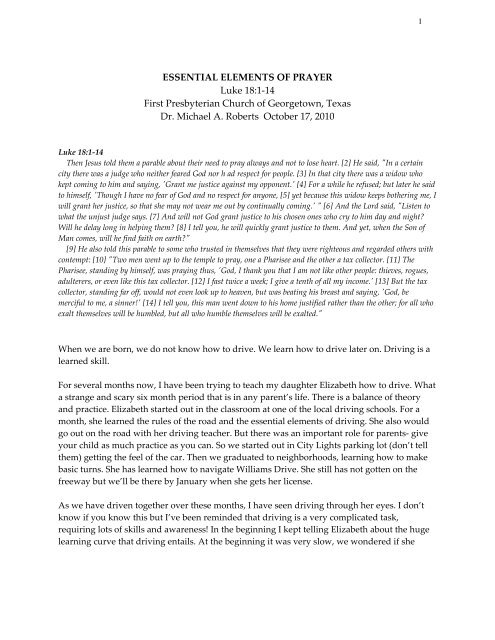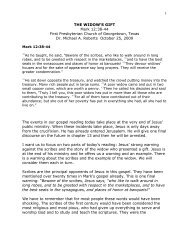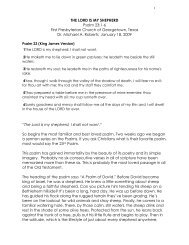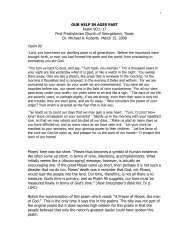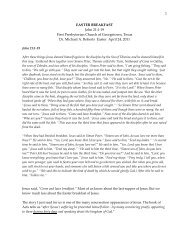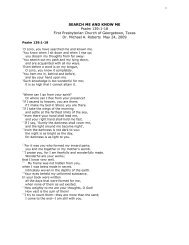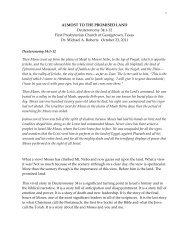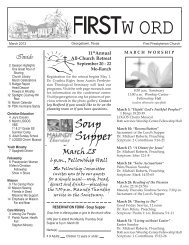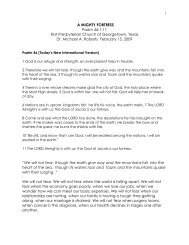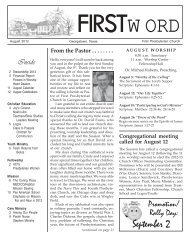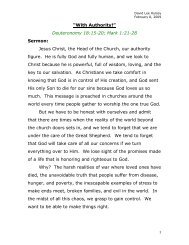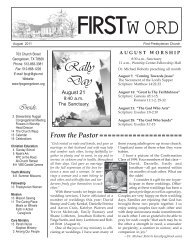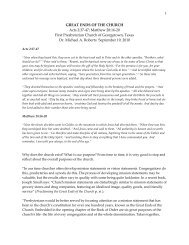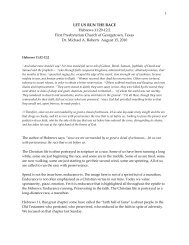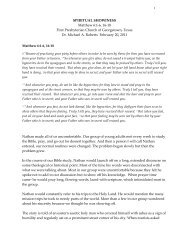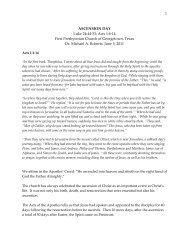ESSENTIAL ELEMENTS OF PRAYER Luke 18:1-14 First ...
ESSENTIAL ELEMENTS OF PRAYER Luke 18:1-14 First ...
ESSENTIAL ELEMENTS OF PRAYER Luke 18:1-14 First ...
Create successful ePaper yourself
Turn your PDF publications into a flip-book with our unique Google optimized e-Paper software.
1<br />
<strong>ESSENTIAL</strong> <strong>ELEMENTS</strong> <strong>OF</strong> <strong>PRAYER</strong><br />
<strong>Luke</strong> <strong>18</strong>:1-<strong>14</strong><br />
<strong>First</strong> Presbyterian Church of Georgetown, Texas<br />
Dr. Michael A. Roberts October 17, 2010<br />
<strong>Luke</strong> <strong>18</strong>:1-<strong>14</strong><br />
Then Jesus told them a parable about their need to pray always and not to lose heart. [2] He said, "In a certain<br />
city there was a judge who neither feared God nor h ad respect for people. [3] In that city there was a widow who<br />
kept coming to him and saying, 'Grant me justice against my opponent.' [4] For a while he refused; but later he said<br />
to himself, 'Though I have no fear of God and no respect for anyone, [5] yet because this widow keeps bothering me, I<br />
will grant her justice, so that she may not wear me out by continually coming.' " [6] And the Lord said, "Listen to<br />
what the unjust judge says. [7] And will not God grant justice to his chosen ones who cry to him day and night?<br />
Will he delay long in helping them? [8] I tell you, he will quickly grant justice to them. And yet, when the Son of<br />
Man comes, will he find faith on earth?"<br />
[9] He also told this parable to some who trusted in themselves that they were righteous and regarded others with<br />
contempt: [10] "Two men went up to the temple to pray, one a Pharisee and the other a tax collector. [11] The<br />
Pharisee, standing by himself, was praying thus, 'God, I thank you that I am not like other people: thieves, rogues,<br />
adulterers, or even like this tax collector. [12] I fast twice a week; I give a tenth of all my income.' [13] But the tax<br />
collector, standing far off, would not even look up to heaven, but was beating his breast and saying, 'God, be<br />
merciful to me, a sinner!' [<strong>14</strong>] I tell you, this man went down to his home justified rather than the other; for all who<br />
exalt themselves will be humbled, but all who humble themselves will be exalted."<br />
When we are born, we do not know how to drive. We learn how to drive later on. Driving is a<br />
learned skill.<br />
For several months now, I have been trying to teach my daughter Elizabeth how to drive. What<br />
a strange and scary six month period that is in any parent’s life. There is a balance of theory<br />
and practice. Elizabeth started out in the classroom at one of the local driving schools. For a<br />
month, she learned the rules of the road and the essential elements of driving. She also would<br />
go out on the road with her driving teacher. But there was an important role for parents- give<br />
your child as much practice as you can. So we started out in City Lights parking lot (don’t tell<br />
them) getting the feel of the car. Then we graduated to neighborhoods, learning how to make<br />
basic turns. She has learned how to navigate Williams Drive. She still has not gotten on the<br />
freeway but we’ll be there by January when she gets her license.<br />
As we have driven together over these months, I have seen driving through her eyes. I don’t<br />
know if you know this but I’ve been reminded that driving is a very complicated task,<br />
requiring lots of skills and awareness! In the beginning I kept telling Elizabeth about the huge<br />
learning curve that driving entails. At the beginning it was very slow, we wondered if she
2<br />
would ever get it, but now she is so much more confident. Even though my blood pressure has<br />
risen 30 points, she is learning how to drive. She wasn’t born knowing how to drive. Driving is<br />
a learned skill.<br />
Prayer is also a learned skill. No one is born knowing how to pray. Christians do not<br />
automatically know how to pray. It’s a learned skill. Both theory and practice are important.<br />
Prayer is central to the Christian life. Disciples of Christ, whether then or now, have always<br />
wanted to know how to pray. The apostles of Jesus were the same way. They had followed<br />
Jesus for a while now, and they wanted to know how to pray. Our text in <strong>Luke</strong> 11 begins, Jesus<br />
“was praying in a certain place, and after he had finished, one of his disciples said to him, Lord, teach us<br />
to pray, as John taught his disciples” (<strong>Luke</strong> 11:1). Prayer is a learned skill. Anybody can learn how<br />
to pray. And anyone can improve their prayer life.<br />
The scriptures are full of guidance on how to pray. I have preached many sermons on prayer<br />
over the years, focusing on those scriptures. Jesus provides a model prayer for us in the Lord’s<br />
Prayer. We learn that prayer is a simple conversation with God, talking and listening. We learn<br />
that prayer is strengthened by a connection to scripture. Our life of prayer is enriched when we<br />
engage in many types of prayer- adoration, confession, thanksgiving, petition, intercession.<br />
Jesus taught his disciples to pray and he is still teaching today with these two parables in <strong>Luke</strong><br />
<strong>18</strong>. He lifts up two essentials of prayer this morning: the importance of persistence and the<br />
importance of humility. When we pray, we are persistent and we are humble.<br />
We don’t always know why Jesus tells a parable. But in the case of these two parables, <strong>Luke</strong><br />
tells us exactly why Jesus spoke them. Verse 1: “Jesus told them a parable about their need to pray<br />
always and not to lose heart.” Verse 9: “He also told this parable to some who trusted in themselves that<br />
they were righteous and regarded others with contempt.” From the get go then we know why Jesus<br />
spoke these words.<br />
We start with our need to pray always and not to lose heart. There are times when we do lose<br />
heart. There are times when it seems like prayer doesn't accomplish a whole lot. There are<br />
times when we pray and pray and nothing seems to happen.<br />
We may be praying for someone's health. We pray that everything would turn out all right, but<br />
it doesn't. We pray. We pray every single day, sometimes it seems like we pray every minute.<br />
But nothing seems to happen, the disease continues unchecked.<br />
Or maybe we’re praying for a relationship. Once we were good friends but something<br />
happened that has caused a severe chasm in the friendship. There is misunderstanding,<br />
bitterness, anger. We pray. We pray every day that God would intervene and transform<br />
human hearts and bring about reconciliation. But day after day, the coldness remains, nothing<br />
happens.
3<br />
Or maybe we're praying on a bigger scale- for the war in Afghanistan, for hungry people, for<br />
the direction of our country. If we're concerned about our world at all, if we're passionate, we<br />
pray. We pray a lot. There are times, Jesus acknowledges, when we might lose heart. So he<br />
tells us a parable.<br />
The parable of the unjust judge in verses 1 through 8 places the accent on persistence. The<br />
context here is a small town where the judge has set up shop to settle disputes. This judge was<br />
harsh. He did not fear God nor have respect for people, it says. The other character in the story<br />
is a widow. The widow is a symbol in that society of powerlessness. There were few resources<br />
to help widows in that time. This woman was involved in a dispute, she had been treated<br />
unfairly and she went to the judge for justice.<br />
We can imagine that initially the judge slammed the door in her face. But she would not give<br />
up. She kept coming to his courtroom. She came up to him at parties. The judge would be out<br />
walking his dog and run into her. Finally, the judge admits in verse 5 that because she keeps<br />
bothering him, he will "grant her justice, so that she may not wear me out by continually coming."<br />
Now, Jesus is not saying that God is like an unjust, harsh judge. Some have made that equation<br />
but Jesus is going beyond that. He is using a lesser to greater argument. If an unjust judge will<br />
consider the persistent requests of a widow how much more will God, who loves and cares for<br />
us, listen and respond to the requests of persistent prayers. Jesus is not equating the unjust<br />
judge and God. Jesus is contrasting the two.<br />
Jesus concludes the parable by saying: “will not God grant justice to his chosen ones who cry to him<br />
day and night? Will he delay long in helping them? I tell you, he will quickly grant justice to them.”<br />
The word “quickly” is a relative term. "Quickly" in verse 8 obviously doesn't mean<br />
"immediately", at least from our perspective. Perhaps from God's perspective it does. For the<br />
truth is that there are times when we pray and nothing much seems to happen. There are<br />
times when we learn that God's response is no or not yet.<br />
Notice also where the emphasis is in this parable. The emphasis is more on the resolution of<br />
problems at the end of history rather than on answered prayer in the short term. Let's face itthere<br />
will be times when malignancies lead to death and frozen relationships never thaw out,<br />
and wars that will go on for years- all of this despite how much we pray. There are times when<br />
we will get discouraged about the efficacy of our praying. Jesus admits that we are going to get<br />
discouraged at times. We will get tired. We will lose heart. We will.<br />
Jesus admits that with his telling of this parable. There will be times when with the early<br />
church we will cry out “How long, O Lord?” This parable then is more about the resolution at<br />
the end. Notice in verses 6 to 8 that the theme is God granting justice rather than God granting<br />
requests. Notice too the link with the future coming of the Son of Man.
4<br />
In the end, God will heal all and raise them to new life. In the end, relationships will find<br />
reconciliation. In the end, war will be no more. In the end, God will grant justice.<br />
This is not to say that God doesn't respond to our prayers in the short-term. Certainly God<br />
does. I could tell you stories of answered prayer in my own life and together we could<br />
collectively fill up many hours rejoicing in God’s goodness. God will accomplish his will.<br />
God's reign will come.<br />
There are times when we see the results almost immediately. There are times when we wait<br />
many weeks or years to see the fruit of our prayers. There are times when God accomplishes<br />
God’s will only at the end. But it is sure! God will act. God will respond.<br />
So we don't give up. We don't lose heart. We are called to walk by faith, trusting that God is at<br />
work in the world and will one day bring justice for all of God's people.<br />
What do you do though, when prayer itself becomes really, really hard? Sometimes life is<br />
overwhelming. We’re going through a crisis, we lack energy, we’re upset and angry. Any<br />
number of circumstances can cause prayer to be really hard. What do we do then?<br />
Several things have been helpful to the saints through the ages. The first is to pray the psalms. I<br />
have found great comfort in praying the psalms. I will turn to a psalm and simply read it,<br />
understanding that I am expressing my concerns, my thoughts, my prayers to God. Not all the<br />
psalms are as helpful at all points in our lives. Selection is critical but there is a psalm for<br />
whatever you’re going through or wherever you are in your life. (Psalms that I suggest to get<br />
you started include: 22, 23, 27, 42, 46, 51, 90, 95, 100, 121, 139, 150).<br />
Also, when we don’t know what to pray or when we can’t pray, it is helpful to lean on the<br />
prayers of others. When I don’t know what to pray, I look for and lean on other people<br />
praying. We will gladly pray for your concern during worship. If your concern is more<br />
confidential, please know that our prayer chain will lift up your concern to God. You can lean<br />
on them. It is certainly my hope that our prayers of the people every Sunday morning voice<br />
some of your concerns.<br />
And when prayer is really hard it is also helpful to remember that the Holy Spirit intercedes<br />
for us. Romans 8:26-27 says: “the Spirit helps us in our weakness; for we do not know how to pray as<br />
we ought, but that very Spirit intercedes with sighs too deep for words. And God, who searches the<br />
heart, knows what is the mind of the Spirit, because the Spirit intercedes for the saints according to the<br />
will of God.” And remember too, that Jesus himself is interceding for us. That’s what Jesus is<br />
doing right at this moment. We say in the Apostle’s Creed: “he ascended into heaven, and<br />
sitteth on the right hand of God the Father Almighty.” What’s Jesus doing there when he<br />
“sitteth”?
5<br />
The historic answer is found in Romans 8:34: “It is Christ Jesus, who died, yes, who was raised, who<br />
is at the right hand of God, who indeed intercedes for us.” That’s what Jesus does now. He no<br />
longer walks the earth healing and teaching. But his ministry continues. It is a ministry of<br />
intercession for you and me. It is seeing our concerns and praying for us.<br />
When praying becomes really hard, we pray the psalms, lean on the prayers of others, and<br />
realize that the Holy Spirit and Jesus himself are interceding for us.<br />
The second parable is a nice complement to the first one. This time the theme is not persistence<br />
but humility. Once again, there are two main characters. You have to understand the<br />
reputations of these characters to fully understand the parable.<br />
The Pharisee is a representative of a religious party which was well known for their strict<br />
adherence to the law. They were respected and esteemed as the most spiritual people in their<br />
society. The tax collector, on the other hand, was reviled by most Jews. The taxes for one thing<br />
went to the hated Romans, the Romans who ruled over them. In addition, the tax collectors<br />
often abused their position by overcharging and putting the excess into their pockets. To top it<br />
all off, these tax collectors were fellow Jews. They were perceived as political traitors and<br />
religiously unclean.<br />
Those were the reputations of the two, those were their roles in society. But appearances can be<br />
deceiving. By reversing their reputations, Jesus makes a point about the spirit or attitude with<br />
which we approach God.<br />
Notice the content of the Pharisee's prayer: “Thank you God that I am not like other people- all<br />
those people who are immoral and just can't get their lives together, all the poor and homeless,<br />
all the “flakes” and uncommitted. As you know, God, I fast twice a week, attend worship every<br />
Sunday, and unlike the uncommitted people, I give you ten percent of my gross income.<br />
Amen.”<br />
Is that a prayer? Is that a person communicating with God? I like what William Barclay says<br />
here: this is not a prayer, this is an "essay in self-congratulation."<br />
Notice the content then of the tax collector's prayer. This person simply prays: "God be merciful<br />
to me a sinner!."<br />
The contrast in attitude here is significant. The Pharisee has no sense of need. His spirituality is<br />
totally independent of God. He is spiritual enough to be virtuous but not spiritual enough to be<br />
humble.<br />
This can happen to us. We can be just like this Pharisee: spiritual, knowledgeable, committed<br />
but self-important and lacking in compassion. There is a common theme between these two<br />
parables. The unjust judge and the Pharisee both disrespect people, they both regard others
6<br />
with contempt, they both look down on the spiritually less committed. Jesus told this parable,<br />
verse 9, “to some who trusted in themselves that they were righteous and regarded others with<br />
contempt.”<br />
So the tax collector becomes our model. The tax collector recognizes great need. This person<br />
recognizes that God is needed desperately in their life. This person throws himself on God's<br />
mercy.<br />
When we "succeed" all by ourselves, the normal tendency is to either boast of our<br />
accomplishments or compare ourselves to other less "successful" spiritual people. But when we<br />
recognize that we need God's mercy and strength and grace to fully live- that can be so<br />
liberating. When we say “God, I can't do this anymore. I need help. I need your guidance. I<br />
can't do this myself.” When we throw ourselves on God's mercy- that's a great place to be. Far<br />
better, Jesus says than thinking we are "sitting pretty" spiritually. “All who exalt themselves will<br />
be humbled, he said, “all who humble themselves will be exalted.”<br />
The late Alex Haley, who authored Roots used to have a picture in his office of a turtle sitting<br />
on top of a fence post. The picture reminded him of a lesson he learned early in his life: If you<br />
see a turtle on a fence post, you know it had some help. Alex Haley used to say: "Any time I<br />
start thinking, Wow, isn't this marvelous what I've done! I look at that picture and remember<br />
how this turtle- me - got up on that post."<br />
Most of us are like that turtle. We had some help along the way- from parents, teachers, youth<br />
leaders, coaches, spouses, from God. Humility is not about belittling ourselves or lacking<br />
confidence. Humility is simply having a true perspective. Charles Spurgeon, the 19th century<br />
preacher, once said that "humility is to make a right estimate of oneself." The apostle Paul in<br />
Romans 12:3 writes: “I say to everyone among you not to think of yourself more highly than you ought<br />
to think, but to think with sober judgment, each according to the measure of faith that God has<br />
assigned.” That’s humility. Humility is recognizing that we had some help to get up on that<br />
fence post.<br />
So we approach God with humility- recognizing our place and our need for God. We approach<br />
God with respect, reverence, and awe. When we pray, we recognize God's sovereignty and<br />
great love for us. We don't need to demand and rant at God. The thing about persistence is<br />
that being persistent can easily turn into being demanding. Being humble can save us from<br />
that.<br />
And so we pray. We realize that God will listen and give us justice. We know that God loves us<br />
and wants us to keep expressing our concerns. When we pray we also recognize our role. God<br />
is God and we are not. We trust in God's continual oversight and deep love for the world. We<br />
pray then with persistence and humility.
7<br />
Prayer is a learning experience. The sooner a Christian understands that, the better off they’ll<br />
be. No Christian knows everything about prayer. When you were born, you didn’t know how<br />
to pray. All of us are in the process of learning to pray. All of us. We learn the theory from the<br />
scriptures. And now we have to practice by actually praying. We still need to take it outsidefor<br />
some on-street praying.<br />
Prayers of the People<br />
Our God, we come into your presence with gratefulness. This act of praying, of communicating<br />
with you we often take for granted. We pause this day to offer you our praise that you are<br />
accessible, open to our cries.<br />
You call us this day to keep on praying, to continue to yearn for your reign in our lives and in<br />
this world. We confess, Dear Lord, that there are times when we lose heart, when we doubt<br />
your provision, when we fail to have the faith that Jesus looks for. Give us glimpses of your<br />
sovereignty, of your overarching purpose in our lives. We desire to trust in you more fully.<br />
Enable us to trust you when the way ahead in dark and uncertain.<br />
We pray for those who have lost hope, for those who have given up praying long ago, for those<br />
who fail to see your action in the world. Inspire us with your great love! May your Spirit move<br />
in our lives: changing, shaping, and setting us free.<br />
We are grateful this morning for our worship together, for the opportunity to fellowship in<br />
your name, to learn more of your word, and for the privilege to reach out in your name. We<br />
thank you for children in our midst and for saints who have joined the church triumphant.<br />
Help us in this church, Holy Spirit, to be faithful, to be committed, to be compassionate. We<br />
pray in the name of the One who still prays for us, Jesus Christ. Amen.


